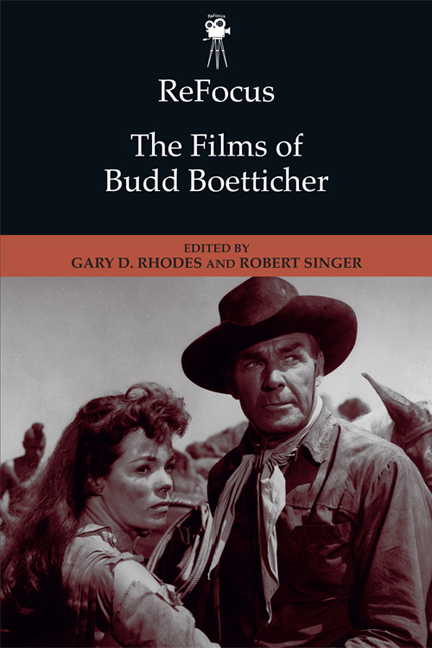Book contents
- Frontmatter
- Contents
- Notes on Contributors
- Dedication
- Introduction
- Part 1 The Non-Westerns
- Part 2 The Westerns
- Part 2 Introduction
- 7 The Ranown Cycle: Budd Boetticher's “New Look” Western Programmers in 1950s Hollywood
- 8 Framings, Motifs, and Floating Poker Games in Seven Men from Now (1956)
- 9 The Ranown Style: Mapping Textual Echoes
- 10 You Were Married, But You Never Had a Wife: The Use of Space in the Westerns of Budd Boetticher
- 11 Ideology and Boetticher's Westerns from the Late 1950s
- 12 Outlaws Without a Cause: Generational Conflict in Budd Boetticher's Ranown Cycle
- 13 The Box in the Desert: Budd Boetticher, Breaking Bad, and the Twenty-first-century Western
- Index
8 - Framings, Motifs, and Floating Poker Games in Seven Men from Now (1956)
from Part 2 - The Westerns
Published online by Cambridge University Press: 22 December 2017
- Frontmatter
- Contents
- Notes on Contributors
- Dedication
- Introduction
- Part 1 The Non-Westerns
- Part 2 The Westerns
- Part 2 Introduction
- 7 The Ranown Cycle: Budd Boetticher's “New Look” Western Programmers in 1950s Hollywood
- 8 Framings, Motifs, and Floating Poker Games in Seven Men from Now (1956)
- 9 The Ranown Style: Mapping Textual Echoes
- 10 You Were Married, But You Never Had a Wife: The Use of Space in the Westerns of Budd Boetticher
- 11 Ideology and Boetticher's Westerns from the Late 1950s
- 12 Outlaws Without a Cause: Generational Conflict in Budd Boetticher's Ranown Cycle
- 13 The Box in the Desert: Budd Boetticher, Breaking Bad, and the Twenty-first-century Western
- Index
Summary
Seven Men from Now was the first in the now celebrated cycle of Westerns starring Randolph Scott and directed by Budd Boetticher. It was scripted by Burt Kennedy, financed and produced by Andrew V. McLaglen, Robert E. Morrison, and an uncredited John Wayne for Batjac Productions (Wayne's production company), and distributed by Warner Bros. Filmed in WarnerColor, and with an initial running time of seventy-seven minutes, Seven Men from Now was conceived as a modest feature, rather than a low-budget B film and, following its official release on August 4, 1956, it was exhibited on its own in at least two cinemas in Washington as well as on double-feature bills with films from the mid-1950s such as The Rawhide Years, King of the Coral Sea, The Steel Jungle and Satellite in the Sky.
Along with André Bazin, champions of Seven Men from Now and the subsequent Boetticher–Scott films include Andrew Sarris who described them “partly as allegorical Odysseys and partly as floating poker games where every character took turns at bluffing about his hand until the final showdown,” hence the title of this essay, and Jim Kitses who wrote a chapter on Boetticher in Horizons West. Kitses provides a detailed commentary on Seven Men from Now in the DVD that was released by Paramount in 2007. I shall draw on Kitses’ commentary at a number of points in this essay. But I aim principally to analyze the ways in which the staging, framing, acting, and editing in three key scenes in Seven Men from Now serve not just to articulate passages of action or conversation (or both) but to do so in ways that complement or augment the nature and implications of what is said, what is done, and what is meant, suggested, or signified. In addition, I aim to draw attention to a series of stagings, framings and visual motifs that serve to link Ben Stride (Randolph Scott) and Annie Greer (Gail Russell) and their largely unspoken attraction to one another. Given the likely input of editor Everett Sutherland and cinematographer William H. Clothier, we cannot be sure that every camera movement, cut, and set-up were devised by Boetticher alone.
- Type
- Chapter
- Information
- ReFocus: The Films of Budd Boetticher , pp. 135 - 148Publisher: Edinburgh University PressPrint publication year: 2017



